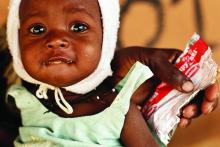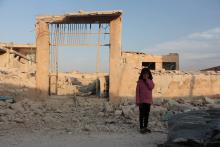The Race to Innovate for Development Should Not Leave Foundational Data Systems Behind
Data is everywhere, constantly being created by humans and machines across the globe. But as half of the world seems to be drowning in data, too many people and places are still invisible in the numbers that drive decisions.
Innovating for Children and Young People
Innovation and the rise of digital technology have forever changed how we work, interact with one another, and create and share information. Innovative technologies are also changing how we, at the United Nations Children's Fund (UNICEF), are supporting children and young people around the world.
UNICEF appoints 19-year-old education activist and Syrian refugee as Goodwill Ambassador
In a historic first, the United Nations Children's Fund (UNICEF) has appointed 19-year-old Muzoon Almellehan, who has been advocating for girls' education since fleeing war-torn Syria in 2013, as its newest – and youngest – Goodwill Ambassador.
Ahead of Father's Day, UNICEF cites critical role fathers play in early childhood learning
A majority of children aged between three- and four-years-old in 74 countries, or about 40 million, have fathers who do not play or engage in early learning activities with them, according to a new study released today by the United Nations Children's Fund (UNICEF).
What these numbers show us is that
Girls worst affected as conflict keeps more than 25 million children out of school – UNICEF
Conflict and violence has driven more than 25 million children between 6 and 15 years old – about 22 per cent of children in that age group – from schools in warzones across 22 countries, the United Nations Children's Fund (UNICEF) has said.
'Unprecedented suffering' for Syrian children in 2016 – UNICEF
13 March 2017 - The suffering of children in war-torn Syria hit rock bottom in 2016 with the highest number of grave violations against them since verification began in 2014, underscored the United Nations children's agency urging all parties to the conflict, those who have influence over them, and anyone who cared about children to find an immediate political solution to end the conflict.
Famine declared in region of South Sudan – UN
20 February 2017 – Famine has been formally declared in parts of South Sudan, the United Nations said today, warning that war and a collapsing economy have left some 100,000 people facing starvation there and a further 1 million people are classified as being on the brink of famine.
EU commits additional 7 million euros to support UNICEF in Iraq
27 December 2016- The United Nations Children's Fund (UNICEF) has received a new pledge of 7 million euros from the European Union to support the UN agency's work in Iraq, where an estimated 11 million are in need of humanitarian assistance- half of them children.
Nearly 535 million children living in crisis-hit countries – UNICEF
9 December 2016 – As the United Nations Children's Fund (UNICEF) prepares to mark the 70th anniversary of its work for the world's most vulnerable children, the agency today issued a stark warning that despite significant progress, too many children are still being left behind, with nearly 535 million of them living in harsh conditions, lacking access to decent health, education and protection services.
Foreword
The UN Chronicle, under the theme Sport Aims for the Goals, considers sport's role in improving lives and achieving the Agenda's Sustainable Development Goals. This issue explores the ways in which sport can enable individuals and communities to build a stronger, more harmonious world.










